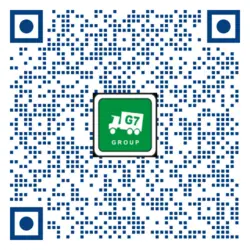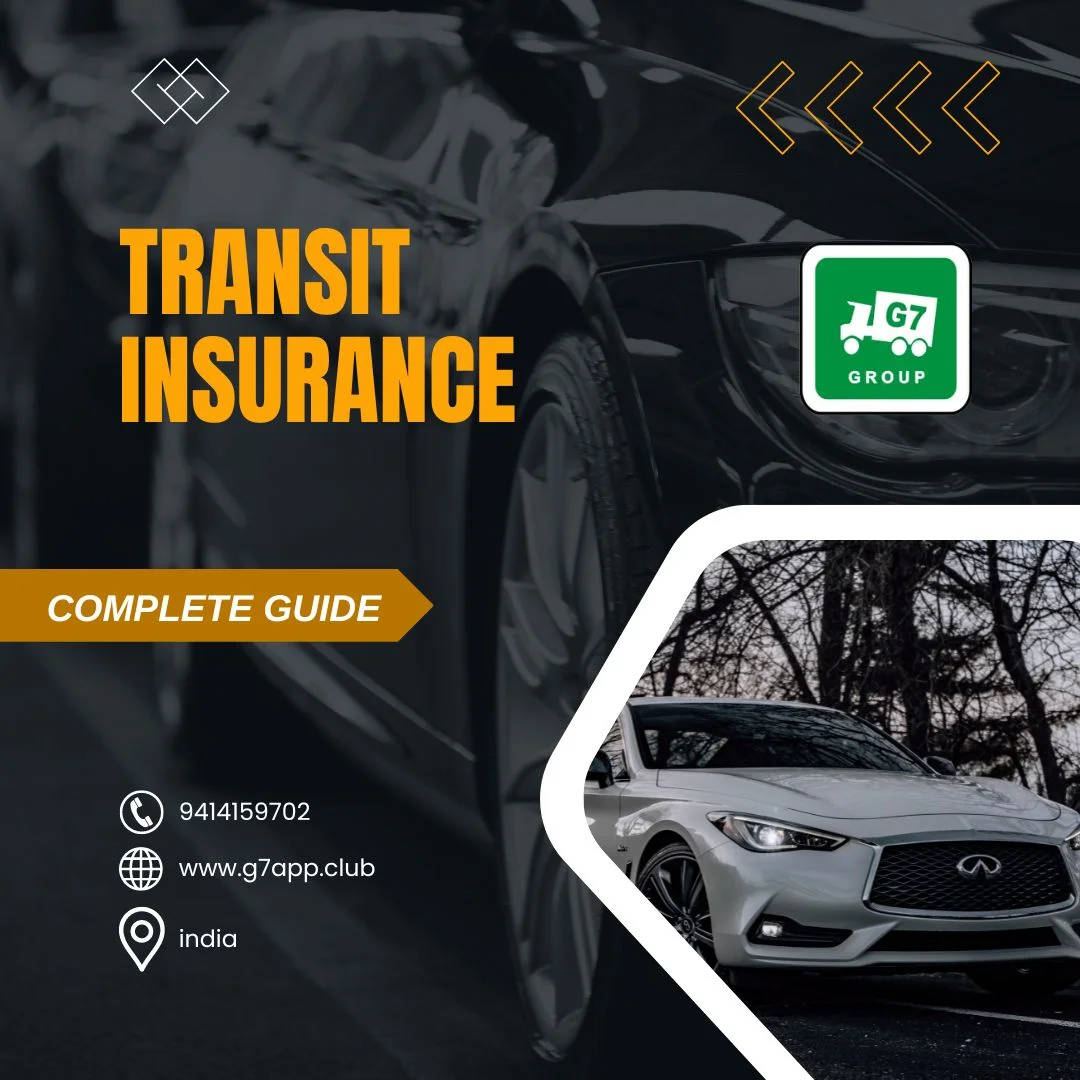
How to File a Claim under an Inland Transit Insurance Policy?
Documents Required for Filing Transit Insurance Claim Online

Transit Insurance is essential to safeguard your goods while they are being transported from one place to another. It provides coverage against damages and losses that may occur during transit, ensuring that you don’t suffer significant losses.
The cost of the premium for transit insurance depends on the value of the goods being transported and the level of risk involved during the policy term.
Goods transit insurance, also known as goods in transit insurance, is a type of insurance that covers the loss or damage of goods while they are in transport. It protects against accidents, theft, fire, natural disasters, and other unforeseen events that may occur during the transportation process.
This type of insurance is commonly used by businesses and individuals involved in the transportation of goods. It offers financial protection by covering the full or partial value of the goods and any associated shipping costs.

Transit insurance policy is essential for protecting your goods and commodities during transportation. Here’s why it is required:
Protection against Accidents: During transit, various accidents can occur, such as overturning of the vessel, collision, theft, fire, and natural disasters like earthquakes and floods. A transit insurance policy provides coverage against these risks, ensuring that you are financially protected if any damage or loss occurs to your goods.
Coverage during Loading and Unloading: The transit insurance policy also covers the risks involved during the loading and unloading of goods. This means that even during these crucial stages of transportation, your goods are protected against any potential damage.
Instant Coverage for Single Transit: You can easily purchase a transit insurance policy online, and it is instantly issued for a single transit. It provides coverage for the entire journey, from the source to the destination, giving you peace of mind knowing that your goods are safeguarded throughout the transit period.
Added Advantages: Transit insurance policies offer additional advantages based on the type of coverage you choose. These advantages may include protection against jettison (dropping of cargo), washing overboard, fire, explosion, and more. It allows you to tailor the coverage according to your specific needs.
By having a transit insurance policy in place, you mitigate the financial risks associated with transportation accidents and ensure that your goods and commodities are well-protected throughout the transit process.

Financial Protection: Goods transit insurance provides financial security by covering the cost of lost, damaged, or stolen goods. This reduces the financial impact on the insured party.
Reputation and Customer Satisfaction: By having goods transit insurance, businesses and individuals can fulfill their obligations to customers even in unexpected circumstances. It helps maintain a good reputation and keeps customers satisfied.
When it comes to transit insurance, there are different types of policies available to suit various needs. Here are the important types of transit insurance:
Single Transit Policy: This type of policy is suitable for businesses that transport goods occasionally or for a single voyage or transit.
Customized Plan: Transit insurance policies can be customized according to specific requirements and needs of the insured.
Open Policy: An open policy covers multiple transits that occur within a specified period, typically one year. It provides convenience for businesses involved in frequent transportation of goods.
Overnight Vehicles’ Insurance Policy: This policy specifically caters to goods in transit during overnight journeys, ensuring their protection.
Goods in Transit through Third-Party Carrier Cover: This type of insurance provides coverage for goods that are being transported by a third-party carrier or logistics service provider.
Goods in Transit through Own Carrier Cover: Businesses that have their own transportation vehicles can opt for this type of insurance to protect their goods during transit.
Cover for Multiple Vehicles: This policy is designed for businesses that utilize a fleet of vehicles for transporting goods, providing coverage for multiple vehicles.
In the digital era, there are also online transit insurance options available. Here are the types of online transit insurance:
Single Transit Policy: Similar to the offline counterpart, this policy is suitable for a single transit or voyage.
Open Policy: Online transit insurance also offers the convenience of an open policy, covering multiple transits within a specific time period.
Sales Turnover Policy: This policy covers various aspects of transactions, including sales, purchases, and internal transfers, providing comprehensive coverage.
When it comes to insuring goods in transit, different types of policies are available. Here are the common types of goods transit insurance:
Marine Cargo Insurance: This type of insurance provides coverage for goods transported via sea or waterways, protecting against risks during marine transit.
Inland Transit Insurance: Designed for goods transported within a country, this insurance covers transportation by road, rail, or inland waterways.
Air Cargo Insurance: Specifically tailored for goods transported by air, this insurance offers protection against risks associated with air transportation.
Multimodal Transit Insurance: This policy is ideal for goods transported using multiple modes of transportation, such as land, air, and sea. It provides comprehensive coverage throughout the entire journey.
It’s essential to carefully evaluate the specific coverage and terms of each type of transit insurance to choose the one that best suits your business or personal needs.

Transit insurance provides compensation for the unavoidable risks that can cause damage to your goods during transportation. Here are the perils against which transit insurance protects your goods:
The coverage under a specific transit insurance policy can vary based on different clauses. Here are the coverages under the Inland Transit Clause A and B, and Institute Cargo Clause A and B:
Includes all the coverages mentioned under Inland Transit Clause B, along with the following:
Provides all-risk coverage, subject to specific exclusions, including but not limited to:
These coverages ensure that your goods are protected against a range of risks and provide financial security during transportation.

When it comes to marine transit insurance policies, there are several major exclusions to be aware of. These exclusions outline situations where the insurance coverage may not apply. Here are the important exclusions to note:
Wilful Misconduct: The transit insurance policy does not cover any damages or losses caused intentionally or due to deliberate actions.
Ordinary Leakage, Loss in Weight-Volume: Losses or damages resulting from normal leakage, loss in weight, or loss in volume are not covered by the policy.
Insufficient Packing: If the goods are not adequately packed to withstand the normal risks of transportation, any damages or losses incurred may not be covered.
Delay: Transit insurance typically does not cover losses or damages caused by delays in the transportation process.
Inherent Vice: Damages resulting from the natural characteristics or qualities of the goods themselves are usually excluded from coverage.
Unfitness of Aircraft-Container - Van: If the aircraft, container, or van used for transportation is deemed unfit or unsuitable and it leads to damages or losses, the insurance coverage may not apply.
Nuclear Perils: Damages or losses caused by nuclear perils, such as radiation or nuclear explosions, are generally excluded from transit insurance coverage.
War Risks and Strikes, Riot & Civil Commotion (in case of inland transit insurance policy): Losses or damages arising from war risks, strikes, riots, or civil commotion may not be covered, especially in the case of inland transit insurance policies.
Insolvency or Financial Default: If the owners, managers, charterers, or operators of the vessel become insolvent or face financial default, resulting losses or damages may not be covered by the transit insurance policy.
It is important to review the specific terms and conditions of your transit insurance policy to fully understand the exclusions and limitations that apply.
Transit insurance is designed to provide protection for goods during transportation. It can be purchased by various parties involved in the process. Here are the types of individuals and businesses who can benefit from transit insurance:
Traders (Importers and/or Exporters): Traders who engage in buying and selling goods, whether domestically or internationally, can purchase transit insurance to safeguard their goods during transit.
Manufacturers: Manufacturers who transport their products from the production site to distribution centers or customers can opt for transit insurance to protect their goods from potential damages or losses.
Aggregators / Transporters: Aggregators or transporters who are responsible for transporting goods on behalf of multiple businesses or individuals can acquire transit insurance to mitigate risks associated with transportation.
Importers/Exporters: Importers and exporters involved in international trade can purchase transit insurance to secure their goods during the transit process, ensuring their value is protected.
Custom House Agents: Custom house agents who handle the logistics and customs clearance procedures for imported or exported goods can also benefit from transit insurance to safeguard the goods they handle.
Anyone in Need of Goods Insurance: Any individual or business that wants to safeguard their goods during transit, regardless of the nature of their business, can opt for transit insurance to provide financial protection in case of unforeseen events.

Online transit insurance is a convenient and efficient way to protect your goods during transportation. Here’s what you need to know:
Purpose: Transit insurance online is specifically designed to safeguard goods while they are being transported between different destinations. It provides coverage for damages and losses incurred during the transit period, whether the goods are carried by a private vehicle or a third-party carrier.
Immediate Coverage: With online transit insurance, you have the option to insure your goods immediately by paying a premium for a single consignment. This means you can get coverage quickly and easily without the need for lengthy paperwork or delays.
Easy Online Purchase: Purchasing transit insurance online with SecureNow is a simple and hassle-free process. You start by providing your contact details and basic information.
Transit Details: Next, you fill in the transit details, including the category of goods to be transported and the value of the commodities. Based on this information, the sum assured (coverage amount) is calculated.
Choose Premium and Coverages: On the quotes page, you can choose the premium amount you are comfortable with based on the available coverages. This allows you to customize your policy according to your specific needs.
Proposal Form and Payment: You will be presented with a proposal form that needs to be filled with the required details for the online transit policy. Once the form is completed, you can proceed to make the payment.
Instant Certificate of Insurance: After making the payment, you will receive an instant certificate of insurance, confirming that your goods are protected during transit.
By opting for online transit insurance, you can quickly secure coverage for your goods during transportation with minimal hassle and paperwork. It provides peace of mind knowing that your goods are insured and protected throughout the transit journey.

Transport insurance policies provide coverage for goods being transported from one location to another. Here are the key points to know:
Types of Policies: There are different types of transport insurance policies available, including road transport insurance, car transport insurance, and goods carrying vehicle insurance.
Road Transport Insurance: This policy covers vehicles used for transportation on roads and protects against risks like accidents, theft, and vehicle damage. Premiums are based on factors such as vehicle type, age, and driver experience.
Car Transport Insurance: Specifically designed for transporting vehicles, this policy covers risks during transportation such as damage, theft, and accidents. Premiums depend on car value, distance, and mode of transportation.
Goods Carrying Vehicle Insurance: For commercial vehicles used to transport goods, this policy covers risks like theft, damage, and accidents. Premiums are determined by vehicle type, nature of goods, and transportation distance.
Cost Factors: The cost of transport insurance depends on factors like goods value, transportation distance, and risk level. Car transport insurance premiums can range from a few thousand rupees to tens of thousands, based on various factors.
Specialized Policies: There are specialized policies for specific goods, such as perishable items or hazardous materials. These provide additional coverage and protection during transportation.
Importance: Transport insurance is crucial in the industry, safeguarding against unexpected circumstances that may lead to loss or damage of goods.
Domestic transit insurance is a policy that covers goods transported within India. Key details include:
Coverage: The policy protects goods owners against losses or damages during transit, including risks like theft, damage, and natural disasters.
Availability: Domestic transit insurance is available for individuals and businesses. It can be customized based on goods type and transportation mode (road, rail, or air).
Domestic Freight Insurance: Similar to domestic transit insurance, this policy covers carriers transporting goods rather than the goods themselves.
Premium Factors: Premiums depend on goods value, transportation distance, and risk level. Proof of damage or loss is required for claims.
Importance: Domestic transit insurance is not mandatory in India, but highly recommended for frequent transporters as it provides financial protection against unforeseen circumstances.
Purchase: Domestic transit insurance can be bought from insurance companies and brokers across India.
Understanding these aspects of transport insurance policies helps ensure the protection of goods and financial security during transit.

Moving to a new home can be a stressful experience, but Transit Insurance can provide the peace of mind you need. Here are the key points to know:
Transit Insurance Coverage: Transit Insurance covers your possessions while they are being transported from your old home to your new home, whether you’re moving within Australia or overseas.
Who Should Consider Transit Insurance: If you’re moving home and want that extra layer of protection for your belongings, Transit Insurance is worth considering.
Comprehensive Coverage: Transit Insurance not only covers the transportation of your belongings but also includes packing and unpacking within 30 days of the insurance period ending. This ensures your entire move is protected from start to finish.
Policy Coverage Variations: The coverage provided by Transit Insurance can vary depending on the policy you choose. It’s important to review the specifics of each policy to understand the level of protection it offers.
Possible Coverage Examples: Some examples of possible coverage under Transit Insurance include:
Loss of or damage to goods during the transit journey. Worldwide coverage may be available, subject to acceptance criteria. Moving home is a significant event, and having Transit Insurance can provide you with the peace of mind that your belongings are protected throughout the moving process. Make sure to review different policies to find the one that best suits your needs and offers the coverage you require.

If your goods have been damaged during transit, you can file a claim under your inland transit insurance policy by following these steps:
Approach Your Insurance Broker: Contact your insurance broker or agent who helped you purchase the inland transit insurance policy. They will guide you through the claim process.
Gather Required Documents: Collect the necessary documents to file your claim. These documents typically include:
Contact Your Insurance Broker: Submit the collected documents to your insurance broker or agent who will assist you in filing the claim. They will forward the documents to the insurance company on your behalf.
If you are filing a transit insurance claim online, you will need the following documents:
Filing a claim for transit insurance is a straightforward process. If your goods encounter damage during transportation, follow these steps:
Notify SecureNow: Send an email to Insurance Company to inform them about the damage. Include details such as photographs taken immediately after the incident, a copy of the policy, the value of the transported goods, and the approximate value of the damaged goods.
Appointment of Surveyor: The insurance company will appoint a surveyor to assess the damage. The surveyor will inspect the goods and the supporting documentation.
Additional Documents: If requested by the surveyor, provide any additional documents they may require to process the claim.
Claim Settlement: Once the surveyor completes the inspection and reviews all the necessary documents, the claim will be settled based on their assessment.
Remember to follow the instructions provided by your insurance broker throughout the claim process to ensure a smooth and efficient resolution of your transit insurance claim.

A: In most cases, the insurer will compensate you up to the value of the item as per the invoiced amount (adjusted for depreciation if the item is used) along with the cost of transport or shipping. This means that you can expect to receive the amount equivalent to the value of the item at the time of purchase, taking into account any depreciation, as well as the expenses associated with transporting or shipping the item.
Note: The exact compensation amount may vary depending on the terms and conditions of your transit insurance policy. It is advisable to review your policy documents or consult with your insurer for specific details regarding compensation for damaged items in transit.
#TransitInsurance, #TypesoftransitPolicies, #InsuranceCompanies, #OnlineTransitInsurance, #goodstransitinsurance

1 Bagged Packaged Goods, 2. Gadi with Gadi Wala, 3. Boxed Packaged Goods, 4. Online Jobs for Students, 5. Local Transport, 6. MP Transport and Transport Nagar Moving Quotes, 7. Freight Transportation Logistics, 8. Second Hand Trucks, 9. Moving Services, 10. Warehousing, 11. Cargo For Shipping, 12. Professional Packers and Movers in Bangalore, 13.Packers and Movers in Chennai, 14. Transporters in Delhi, 15.G7 House Shifting App, 16. Smooth and Stress-Free Relocation, 17. Join the Biggest Packers and Movers Group, 18. Truck Booking App in India, 19. Top Logistics Apps in India, 20. Join Transporters Group in India, 21. Top Transport Apps in India, 22. Car Transport in India, 23. Save Transport and Moving Costs, 24. Affordable Truck Booking Apps, 25. Starting a Packers and Movers Company, 26. Affordable House-Shifting Services in India, 27. Best-Rated Packers and Movers in India, 28. Packers and Movers App for Office Relocation, 29. Transport Bike from One City to Another, 30. Commercial Truck Booking App for Logistics Companies, 31. Packers and movers for long distance moving, 32. Top Truck Rental Apps for Local and Outstation Deliveries

Head Office:
D-301, 209, 2nd Floor, Parasmani Complex,
Nada Khada Chowk, Bapu Bazar,
Udaipur (Raj.) - 313001
Time: 10.00 AM - 6.00 PM
Days: Monday - Saturday
Mobile: +91 7014350720
WhatsApp: +91 7014350720
khitsinstitute@gmail.com
khitsinstitute@gmail.com
